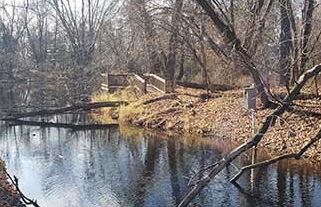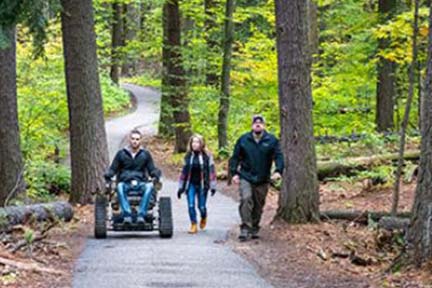| Dec. 14, 2023
Contact: Joe Genzel (Ducks Unlimited), 309-453-0979 or Tammy Newcomb (DNR), 517-284-5832
DNR to invest $4 million in water quality
Wetland restoration effort with Ducks Unlimited aims to improve drinking water, wildlife habitat in Lake Erie and Saginaw Bay watersheds
 Water quality in the western Lake Erie and Saginaw Bay watersheds is getting a major boost: a $4 million initiative aimed at advancing wetland restoration and reducing harmful algal blooms in the two regions. Water quality in the western Lake Erie and Saginaw Bay watersheds is getting a major boost: a $4 million initiative aimed at advancing wetland restoration and reducing harmful algal blooms in the two regions.
The Michigan Department of Natural Resources and Ducks Unlimited are partnering on the project, through the Lake Erie and Saginaw Bay Wetland Conservation Program with funding from the American Rescue Plan Act. DU will administer the ARPA and WCP funds and is already looking for local municipalities and private landowners interested in taking action to restore wetlands on their property.
DU will host an informational webinar via Zoom 10-11:30 a.m. EST Friday, Jan. 12, for anyone interested in this opportunity. Sign up for the webinar here. The webinar will also be recorded and shared. |
“This grant could not have come at a better time, but the money has to be spent by December 2026 so we need to act fast,” said DU regional biologist Kali Rush. “Lake Erie and Saginaw Bay have lost more than 80% of historical wetlands, which has significantly compromised water quality for residents and wildlife in our state.”
The Michigan Department of Environment, Great Lakes, and Energy and the Michigan Department of Agriculture and Rural Development also are partnering on this project.
“We can’t do this alone. Partnerships and willing landowners will be key to developing these wetlands and improving water quality and wildlife habitat,” said DNR Director Scott Bowen. “We are excited to make this resource available to private landowners who want to do their part to improve and protect long-term water quality.”
Why are algal blooms bad?
Many factors affect water quality in Michigan’s inland lakes, ponds and the Great Lakes, but harmful algal blooms have become a frequent and expensive problem to manage. HABs are caused by increased levels of nutrients (phosphorus and nitrogen) from fertilizer, wastewater and stormwater runoff that then infiltrate our waterways.
Such blooms occur in western Lake Erie and Saginaw Bay every year. HABs can contain toxins that are poisonous to wildlife, pets and people. They cause areas known as “dead zones” that have little or no oxygen, which can result in massive fish die-offs.
Blooms can also close water to swimming, fishing, boating and other water-based recreation, and make drinking water unsafe for human consumption. For instance, a toxic bloom once caused a water supply plant in Toledo, Ohio, to shut down because it was being overwhelmed by the amount of algae. Saginaw Bay runs the same risk with its water supply infrastructure.
How do wetlands help?
“People often think of wetlands only as homes for frogs, turtles, fish, muskrats and ducks, but they also serve a critical function for water quality,” Rush said. “Wetlands are the kidneys of our environment, filtering nutrients before they enter rivers, lakes and streams.”
Healthy wetlands will help reduce excess nutrient levels in the water, which is key. They absorb carbon and nutrients and function much like sponges, absorbing and storing water during heavy rainfall and releasing it during drier seasons.

Program background
The $4 million program is part of the DNR’s larger Michigan Legislature-allocated $10 million ARPA grant (in 2021) for wetlands to improve water quality.
The DNR and DU will use the additional $6 million of ARPA funds to support the advancement of several wetland projects that are already underway or in the planning stages, such as those at Crow Island State Game Area in the Saginaw Bay watershed and a water quality-focused wetland project in the Lake Erie watershed. The goal for these wetlands is to reduce phosphorus, nitrogen and sediment entering the waters of Lake Erie and Saginaw Bay.
“This work is going to improve water quality, provide fish and wildlife habitat, and support and enhance Great Lakes tourism and related economic sectors in Michigan,” Bowen said.
For more information about the community-based projects or to sign up for the webinar, email WCP@ducks.org. You can also email DNR-WetlandGrants@Michigan.gov for more information related to this program.
Note to editors: Accompanying photos are available below for download. Photo credit Michigan Department of Natural Resources.
- Spring migration: Trumpeter swans during a spring migration between Bay Port and Fish Point in the Saginaw Bay.
- Black-necked stilt: A black-necked stilt explores the wetlands at Pointe Mouillee State Game Area, along the western shore of Lake Erie.
|





